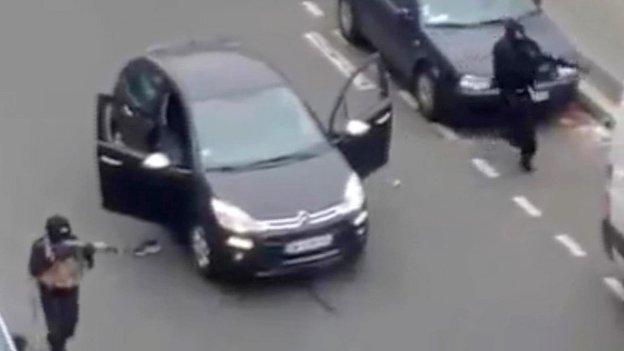Paris attacks: Investigators turn up new leads
- Published
French police and intelligence services are looking into several leads as they try to piece together the movements of the three Paris gunmen who killed 17 people, where and how they bought their weapons, and whether they had accomplices.
Cherif and Said Kouachi and Amedy Coulibaly were killed but investigators are seeking a "fourth man", a suspected accomplice of European appearance, who police believe was working with Coulibaly.
They want to know why Coulibaly, who shot dead a police officer in Montrouge on 8 January and then murdered four hostages at a kosher supermarket the following day, visited Madrid days before the attacks.
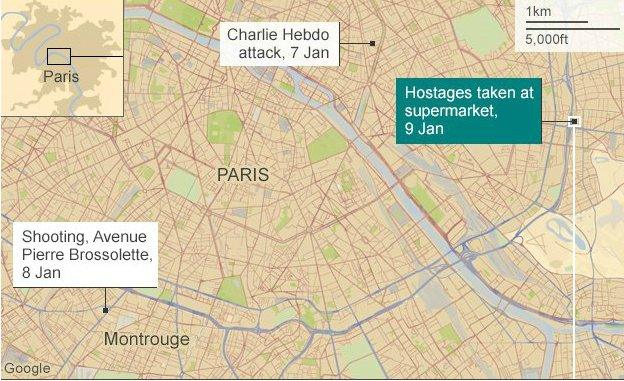
Kalashnikovs
Police were alerted to the possible existence of a fourth man, now suspected of being an accomplice, after searching a house that Coulibaly had rented in the Gentilly district of southern Paris a week prior to the attacks.
There they found a large arsenal of weapons, including three Kalashnikov assault rifles, a rocket-propelled grenade launcher and at least one automatic weapon, along with several grenades and industrial explosives.
They also found a set of keys for a moped or scooter, although Coulibaly had no such vehicle registered to him.
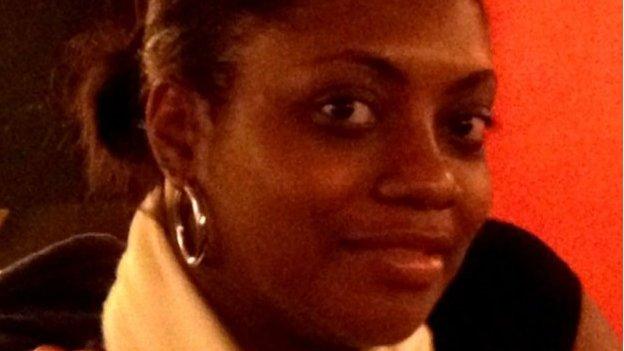
Clarissa Jean-Philippe, the police officer shot dead by Amedy Coulibaly on 8 January
According to sources quoted by French daily Le Parisien, the keys were for a vehicle belonging to a man with a long criminal record.
Police have connected this "fourth man" to the shooting of a jogger in Fontenay-aux-Roses on 7 January, the day of the Kouachi brothers' attack on Charlie Hebdo's offices.
The 32-year-old jogger was shot with an automatic weapon and seriously wounded. There had been concerns that he might not survive, but his condition has improved and he is no longer on the critical list.
'Mafia-like structure'
Before losing consciousness, he reportedly told police his attacker was of European appearance, wearing a black padded jacket with a fur collar, his face obscured by a hood.
Ballistic tests on shell casings found at the scene of the shooting confirmed that the bullets had been fired from the same weapon later used in Coulibaly's attack on the Hyper Cacher supermarket two days later - an automatic Tokarev machine pistol.
Police sources told AP that they believed as many as six members of the same "radical Islamic terror cell", including the suspected Fontenay-aux-Roses gunman, may still be at large.
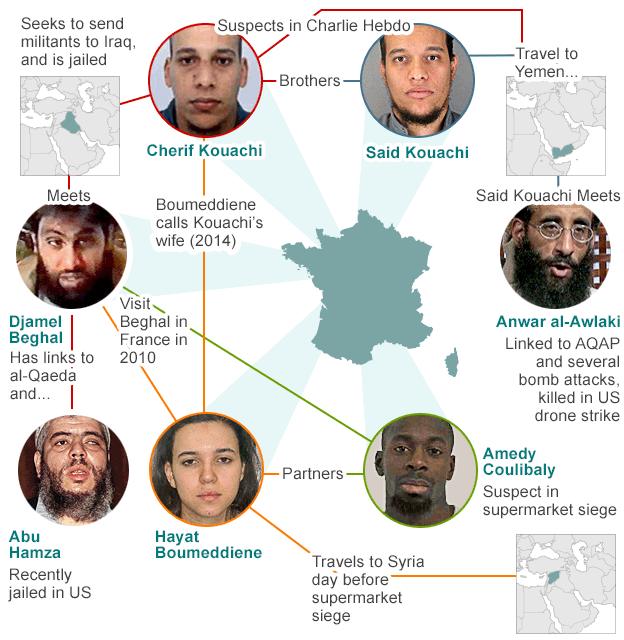
Police union spokesman Christophe Crepin said investigators had identified some "extremely dangerous" people, and that police were up against "a well-organised, mafia-like structure", adding, "we are really in a war".
Eight men and four women were arrested in the Paris metropolitan region overnight between Thursday 15 and Friday 16 January. All 12 were already known to police, according to Interior Minister Bernard Cazeneuve, and were placed in custody on suspicion of providing "logistical support" to Coulibaly.
Three have since been released, and the remaining nine must either be charged or let go by Tuesday evening.
European connections
Cherif Kouachi was convicted of terrorism offences in 2008 for his involvement with the "Buttes-Chaumont network" - which sent young men to fight against Western forces in Iraq.
He said he was motivated after seeing photographs of detainee abuse by US soldiers at Abu Ghraib prison, and is believed to have met Amedy Coulibaly whilst in prison.
A Frenchman of Haitian origin, Fritz-Joly Joachim was detained in Bulgaria on 1 January after trying to cross the Turkish border. He confirmed that he knew the Kouachi brothers, but denied having any prior knowledge of the attacks, saying he was simply going on holiday.
According to Spanish security sources, Coulibaly and his partner Hayat Boumeddiene, 26, travelled to Madrid, arriving on 31 December.
There are conflicting reports as to how long the pair were in the Spanish capital. Anonymous Spanish security sources quoted in El Mundo have said they believe that Coulibaly and Boumeddiene were only in the city for a matter of hours.
There is no record of where they stayed or of any contact with anyone based in Madrid, reports say.
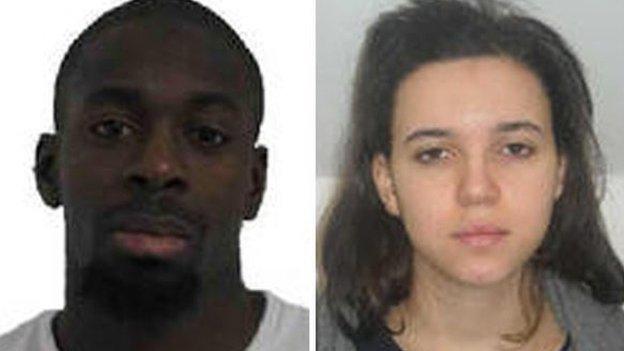
Amedy Coulibaly (left) and Hayat Boumeddiene
On 2 January, Coulibaly is thought to have returned to Paris by car, after dropping his partner at Madrid's Barajas airport, from where she flew to Istanbul.
Boumeddiene, who is understood to be 4 or 5 months pregnant, was incorrectly placed at the scene of the HyperCacher supermarket siege by initial reports on the day. She stayed in Turkey until 8 January and then crossed into Syria, accompanied by another man, Mehdi Belhoucine, who had flown with her from Madrid.
Belhoucine's brother Mohamed was convicted in France in July 2014 of helping would-be fighters reach the Pakistan-Afghanistan border.
Money trail
French newspaper La Voix du Nord has obtained documentation showing that Coulibaly took out a €6,000 ($7,000, £4,600) loan from provider Cofidis in Villeneuve-d'Ascq, Lille, on 4 December, using a genuine ID card and fraudulent payslip.
Belgian media report that some of the weapons used by both Coulibaly and the Kouachi brothers, including the automatic pistol used in the supermarket attack, were bought near Gare du Midi train station in Brussels, for around €5,000 ($5,800, £3,800).

The four men who died after being taken hostage at the HyperCacher supermarket, from left: Yohan Cohen, Philippe Braham, Yoav Hattab and Francois-Michel Saada
Initially it was believed that the money to finance this purchase had come from the Cofidis loan, but, according to Le Parisien, the authorities now believe that Coulibaly may have part-exchanged a black Mini Cooper, bought second-hand in September from a licensed BMW dealer in Bordeaux, for the guns.
The vehicle, registered in Hayat Boumeddiene's name, has still not been found.
Coulibaly may also have had other illicit means of acquiring funds for the attacks. Former associates told AP that he had been selling marijuana and hashish in the suburbs of Paris as recently as one month ago.
A series of anti-terror raids was launched across Belgium last Thursday, targeting what authorities there said was a group of suspected jihadists who were plotting to attack police. A shootout in the eastern city of Verviers left two people dead, although the raids are not believed to be connected to the attacks in Paris.
Belgian authorities have identified the suspected ringleader of the group as Abdelhamid Abaaoud, a Belgian man of Moroccan origin who has not been apprehended.
- Published12 January 2015
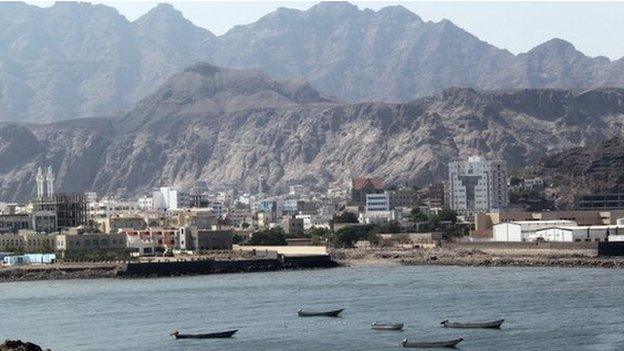
- Published10 January 2015
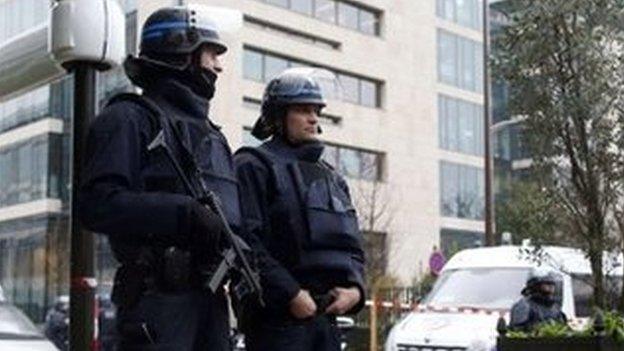
- Published14 January 2015
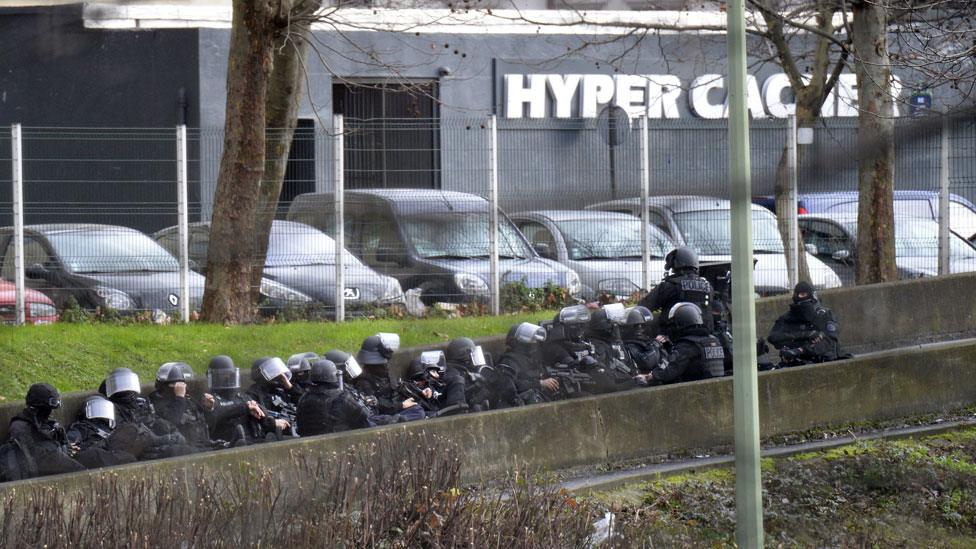
- Published13 January 2015
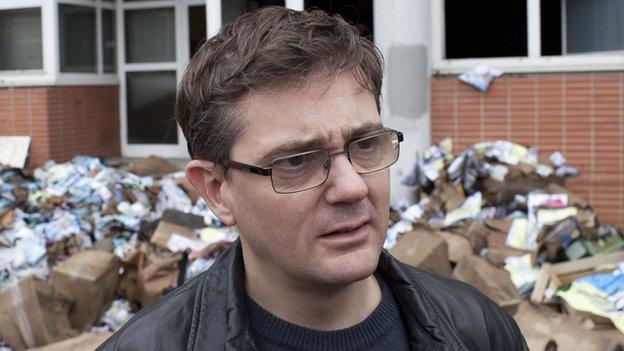
- Published15 January 2015
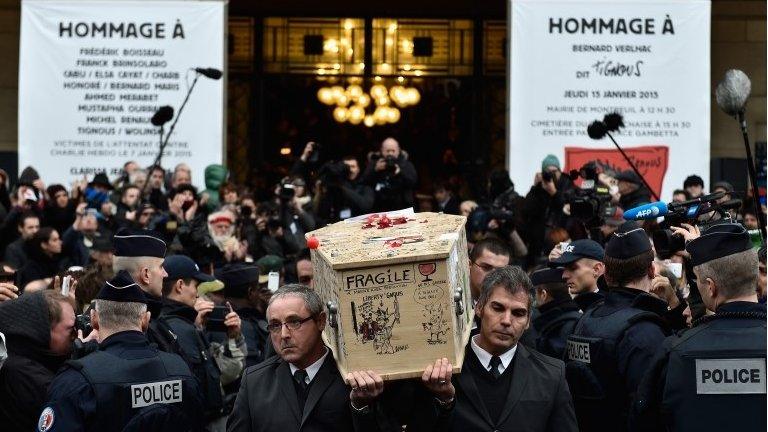
- Published15 January 2015
